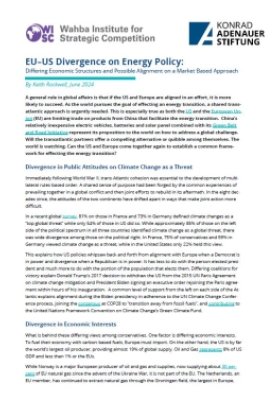EU-US Divergence on Energy Policy: Differing Economic Structures and Possible Alignment on a Market Based Approach


A general rule in global affairs is that if the US and Europe are aligned in an effort, it is more likely to succeed. As the world pursues the goal of effecting an energy transition, a shared transatlantic approach is urgently needed. This is especially true as both the US and the European Union (EU) are limiting trade on products from China that facilitate the energy transition. China’s relatively inexpensive electric vehicles, batteries and solar panel combined with its Green Belt and Road Initiative represent its proposition to the world on how to address a global challenge. Will the transatlantic partners offer a compelling alternative or quibble among themselves. The world is watching. Can the US and Europe come together again to establish a common framework for effecting the energy transition?

